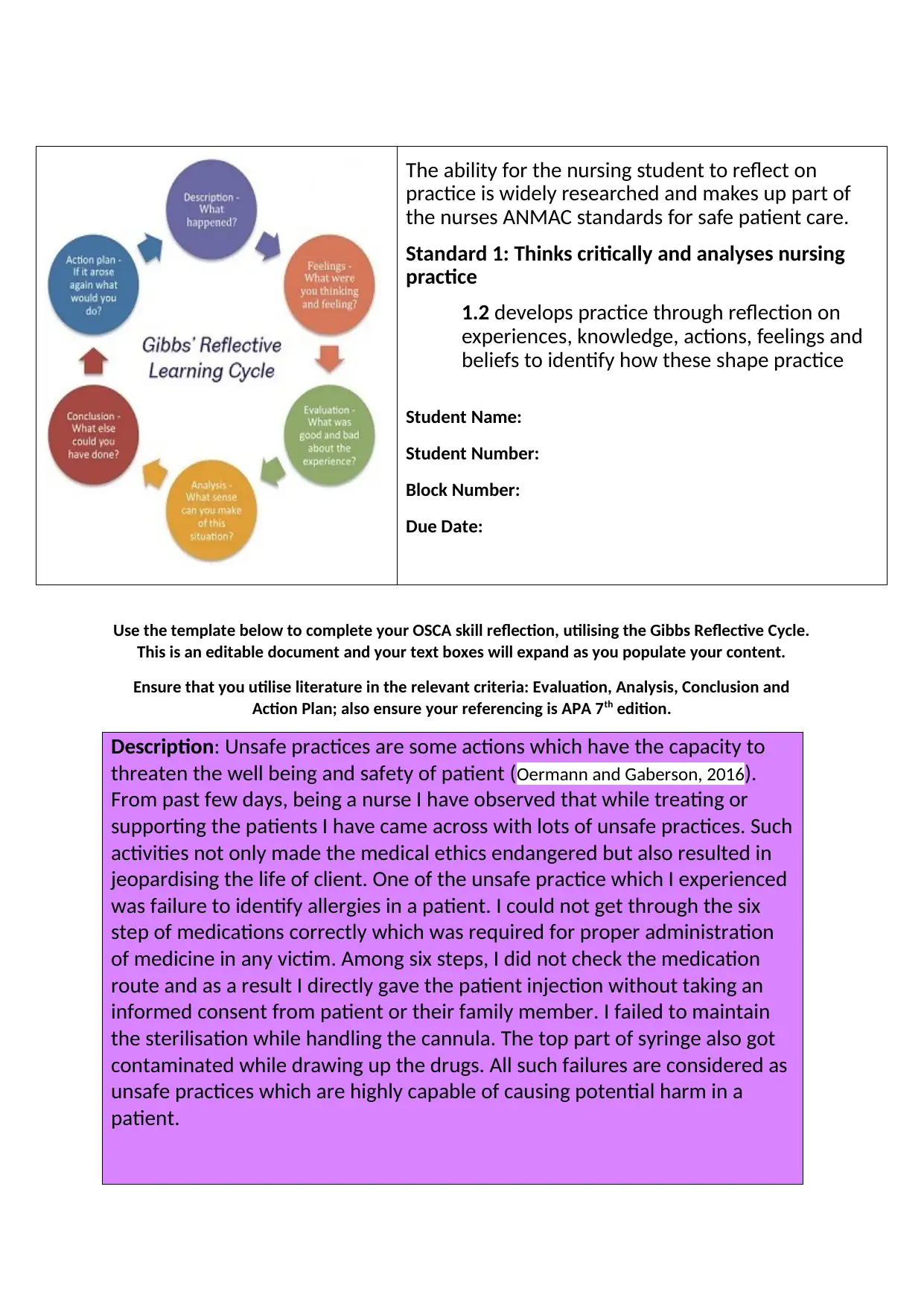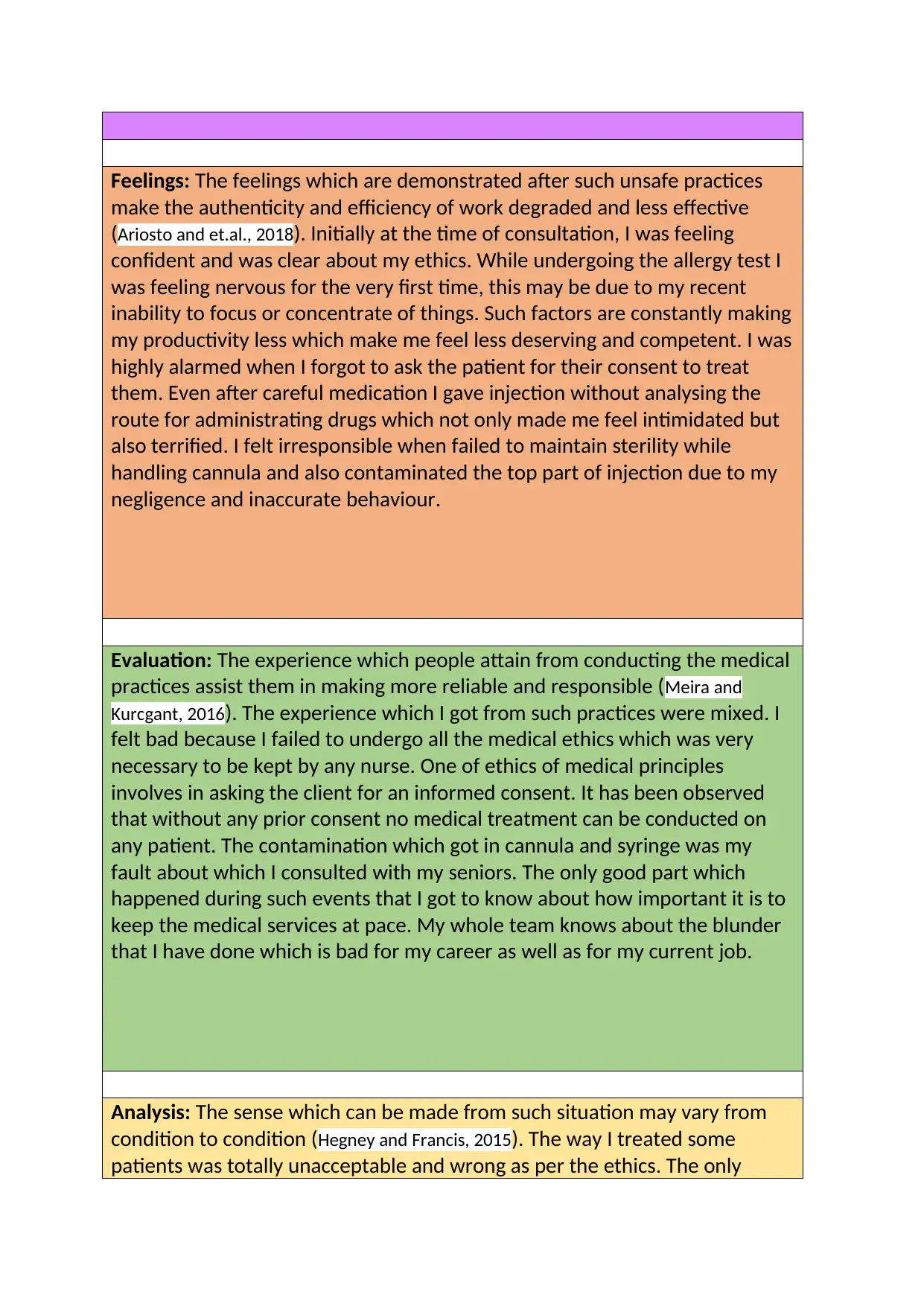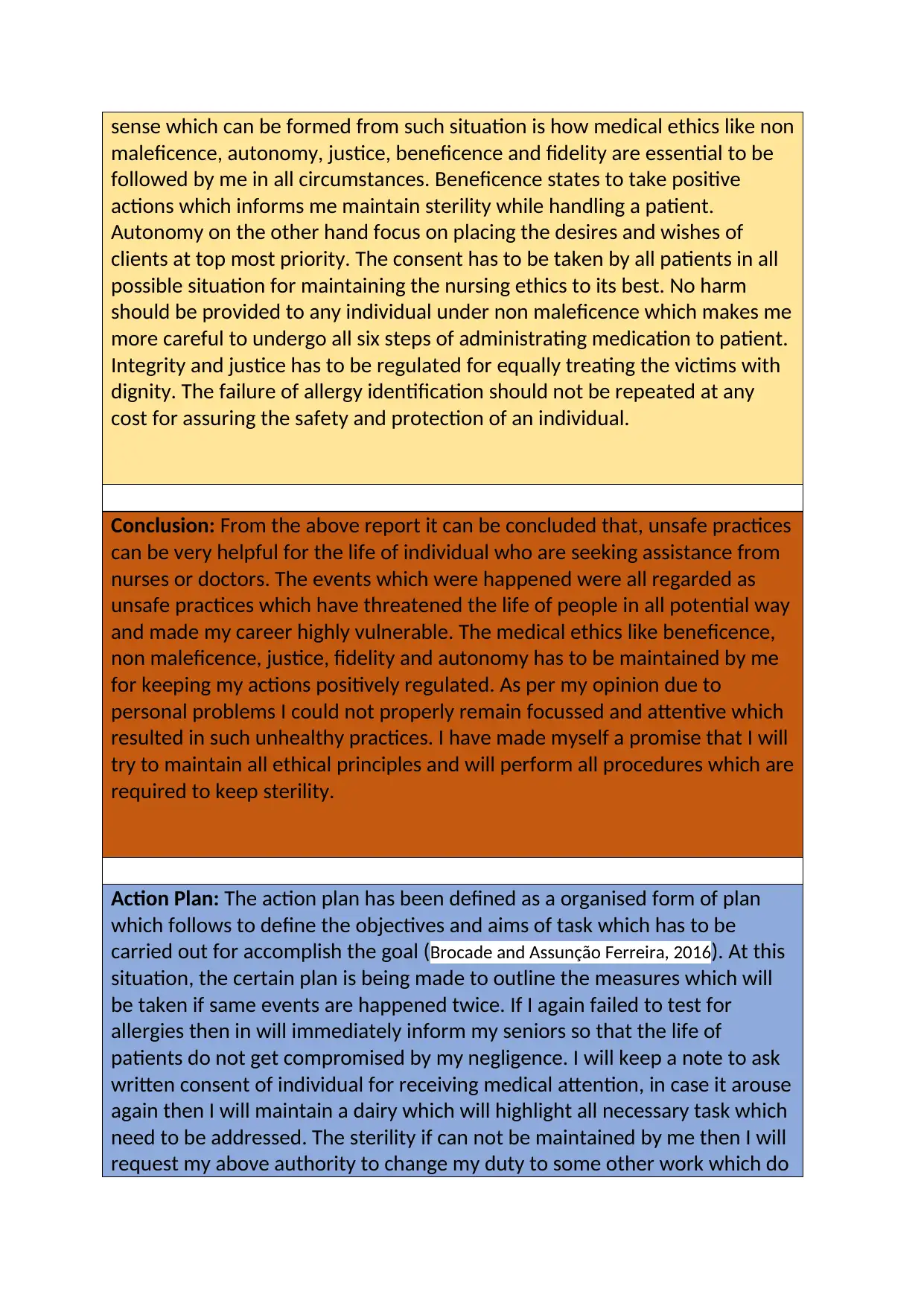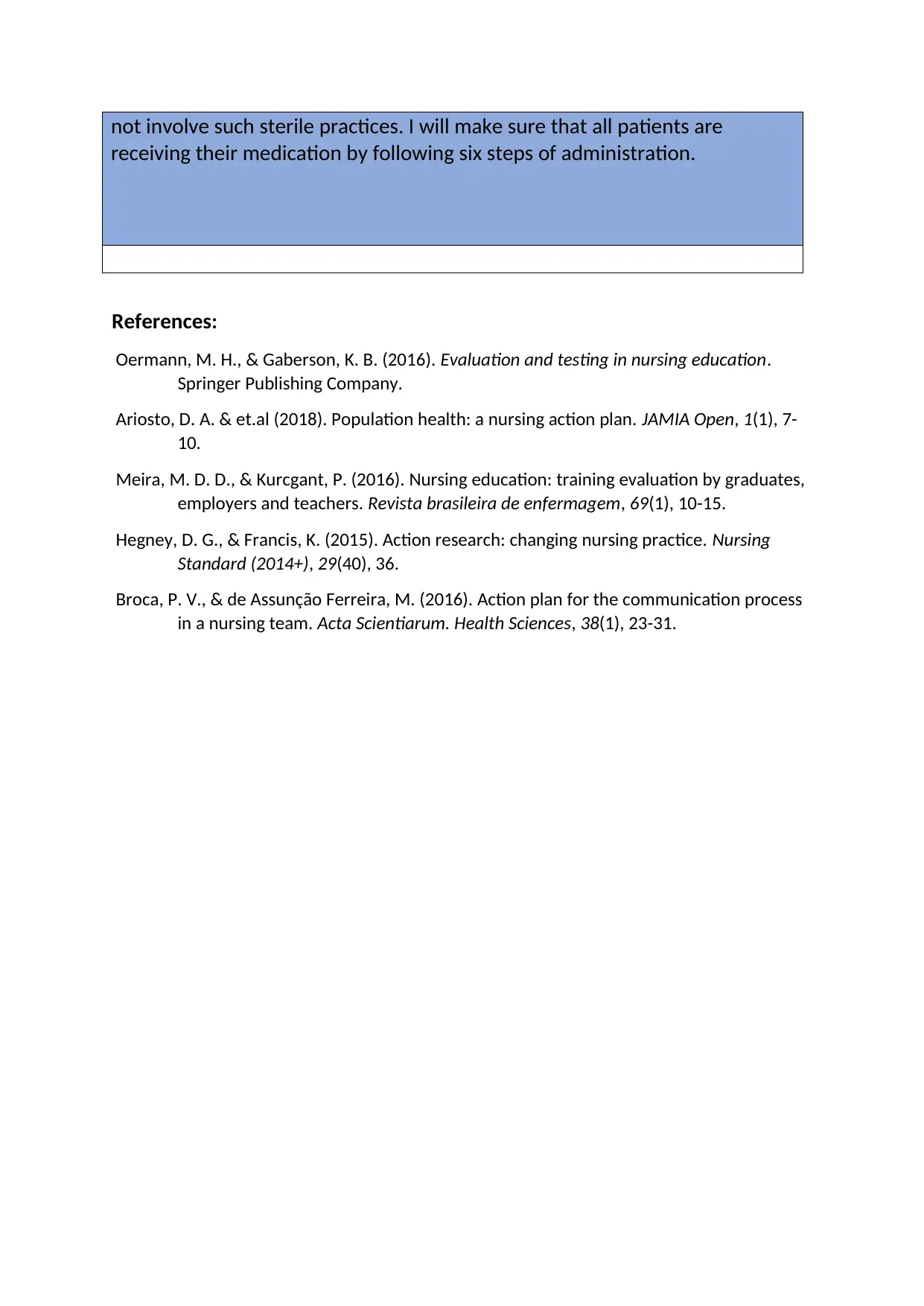HNB2104: Clinical Skills Assessment OSCA Reflection
VerifiedAdded on 2023/01/12
|4
|1347
|71
Report
AI Summary
This report presents a nursing student's reflection on a clinical skills assessment, specifically focusing on parenteral medication administration. The student utilizes the Gibbs reflective cycle to analyze an instance of unsafe practice, detailing the description of the event, associated feelings, and a thorough evaluation. The analysis section delves into the medical ethics violated, such as non-maleficence and autonomy. The conclusion summarizes the key takeaways, and an action plan outlines steps to prevent similar incidents in the future, including informing seniors of any allergy-related issues and maintaining sterility. The report references relevant literature to support the analysis and conclusions, demonstrating the student's critical thinking and understanding of safe patient care practices. This report is an attempt to meet the requirements of the ANMAC standards for safe patient care.

The ability for the nursing student to reflect on
practice is widely researched and makes up part of
the nurses ANMAC standards for safe patient care.
Standard 1: Thinks critically and analyses nursing
practice
1.2 develops practice through reflection on
experiences, knowledge, actions, feelings and
beliefs to identify how these shape practice
Student Name:
Student Number:
Block Number:
Due Date:
Use the template below to complete your OSCA skill reflection, utilising the Gibbs Reflective Cycle.
This is an editable document and your text boxes will expand as you populate your content.
Ensure that you utilise literature in the relevant criteria: Evaluation, Analysis, Conclusion and
Action Plan; also ensure your referencing is APA 7th edition.
Description: Unsafe practices are some actions which have the capacity to
threaten the well being and safety of patient (Oermann and Gaberson, 2016).
From past few days, being a nurse I have observed that while treating or
supporting the patients I have came across with lots of unsafe practices. Such
activities not only made the medical ethics endangered but also resulted in
jeopardising the life of client. One of the unsafe practice which I experienced
was failure to identify allergies in a patient. I could not get through the six
step of medications correctly which was required for proper administration
of medicine in any victim. Among six steps, I did not check the medication
route and as a result I directly gave the patient injection without taking an
informed consent from patient or their family member. I failed to maintain
the sterilisation while handling the cannula. The top part of syringe also got
contaminated while drawing up the drugs. All such failures are considered as
unsafe practices which are highly capable of causing potential harm in a
patient.
practice is widely researched and makes up part of
the nurses ANMAC standards for safe patient care.
Standard 1: Thinks critically and analyses nursing
practice
1.2 develops practice through reflection on
experiences, knowledge, actions, feelings and
beliefs to identify how these shape practice
Student Name:
Student Number:
Block Number:
Due Date:
Use the template below to complete your OSCA skill reflection, utilising the Gibbs Reflective Cycle.
This is an editable document and your text boxes will expand as you populate your content.
Ensure that you utilise literature in the relevant criteria: Evaluation, Analysis, Conclusion and
Action Plan; also ensure your referencing is APA 7th edition.
Description: Unsafe practices are some actions which have the capacity to
threaten the well being and safety of patient (Oermann and Gaberson, 2016).
From past few days, being a nurse I have observed that while treating or
supporting the patients I have came across with lots of unsafe practices. Such
activities not only made the medical ethics endangered but also resulted in
jeopardising the life of client. One of the unsafe practice which I experienced
was failure to identify allergies in a patient. I could not get through the six
step of medications correctly which was required for proper administration
of medicine in any victim. Among six steps, I did not check the medication
route and as a result I directly gave the patient injection without taking an
informed consent from patient or their family member. I failed to maintain
the sterilisation while handling the cannula. The top part of syringe also got
contaminated while drawing up the drugs. All such failures are considered as
unsafe practices which are highly capable of causing potential harm in a
patient.
Paraphrase This Document
Need a fresh take? Get an instant paraphrase of this document with our AI Paraphraser

Feelings: The feelings which are demonstrated after such unsafe practices
make the authenticity and efficiency of work degraded and less effective
(Ariosto and et.al., 2018). Initially at the time of consultation, I was feeling
confident and was clear about my ethics. While undergoing the allergy test I
was feeling nervous for the very first time, this may be due to my recent
inability to focus or concentrate of things. Such factors are constantly making
my productivity less which make me feel less deserving and competent. I was
highly alarmed when I forgot to ask the patient for their consent to treat
them. Even after careful medication I gave injection without analysing the
route for administrating drugs which not only made me feel intimidated but
also terrified. I felt irresponsible when failed to maintain sterility while
handling cannula and also contaminated the top part of injection due to my
negligence and inaccurate behaviour.
Evaluation: The experience which people attain from conducting the medical
practices assist them in making more reliable and responsible (Meira and
Kurcgant, 2016). The experience which I got from such practices were mixed. I
felt bad because I failed to undergo all the medical ethics which was very
necessary to be kept by any nurse. One of ethics of medical principles
involves in asking the client for an informed consent. It has been observed
that without any prior consent no medical treatment can be conducted on
any patient. The contamination which got in cannula and syringe was my
fault about which I consulted with my seniors. The only good part which
happened during such events that I got to know about how important it is to
keep the medical services at pace. My whole team knows about the blunder
that I have done which is bad for my career as well as for my current job.
Analysis: The sense which can be made from such situation may vary from
condition to condition (Hegney and Francis, 2015). The way I treated some
patients was totally unacceptable and wrong as per the ethics. The only
make the authenticity and efficiency of work degraded and less effective
(Ariosto and et.al., 2018). Initially at the time of consultation, I was feeling
confident and was clear about my ethics. While undergoing the allergy test I
was feeling nervous for the very first time, this may be due to my recent
inability to focus or concentrate of things. Such factors are constantly making
my productivity less which make me feel less deserving and competent. I was
highly alarmed when I forgot to ask the patient for their consent to treat
them. Even after careful medication I gave injection without analysing the
route for administrating drugs which not only made me feel intimidated but
also terrified. I felt irresponsible when failed to maintain sterility while
handling cannula and also contaminated the top part of injection due to my
negligence and inaccurate behaviour.
Evaluation: The experience which people attain from conducting the medical
practices assist them in making more reliable and responsible (Meira and
Kurcgant, 2016). The experience which I got from such practices were mixed. I
felt bad because I failed to undergo all the medical ethics which was very
necessary to be kept by any nurse. One of ethics of medical principles
involves in asking the client for an informed consent. It has been observed
that without any prior consent no medical treatment can be conducted on
any patient. The contamination which got in cannula and syringe was my
fault about which I consulted with my seniors. The only good part which
happened during such events that I got to know about how important it is to
keep the medical services at pace. My whole team knows about the blunder
that I have done which is bad for my career as well as for my current job.
Analysis: The sense which can be made from such situation may vary from
condition to condition (Hegney and Francis, 2015). The way I treated some
patients was totally unacceptable and wrong as per the ethics. The only

sense which can be formed from such situation is how medical ethics like non
maleficence, autonomy, justice, beneficence and fidelity are essential to be
followed by me in all circumstances. Beneficence states to take positive
actions which informs me maintain sterility while handling a patient.
Autonomy on the other hand focus on placing the desires and wishes of
clients at top most priority. The consent has to be taken by all patients in all
possible situation for maintaining the nursing ethics to its best. No harm
should be provided to any individual under non maleficence which makes me
more careful to undergo all six steps of administrating medication to patient.
Integrity and justice has to be regulated for equally treating the victims with
dignity. The failure of allergy identification should not be repeated at any
cost for assuring the safety and protection of an individual.
Conclusion: From the above report it can be concluded that, unsafe practices
can be very helpful for the life of individual who are seeking assistance from
nurses or doctors. The events which were happened were all regarded as
unsafe practices which have threatened the life of people in all potential way
and made my career highly vulnerable. The medical ethics like beneficence,
non maleficence, justice, fidelity and autonomy has to be maintained by me
for keeping my actions positively regulated. As per my opinion due to
personal problems I could not properly remain focussed and attentive which
resulted in such unhealthy practices. I have made myself a promise that I will
try to maintain all ethical principles and will perform all procedures which are
required to keep sterility.
Action Plan: The action plan has been defined as a organised form of plan
which follows to define the objectives and aims of task which has to be
carried out for accomplish the goal (Brocade and Assunção Ferreira, 2016). At this
situation, the certain plan is being made to outline the measures which will
be taken if same events are happened twice. If I again failed to test for
allergies then in will immediately inform my seniors so that the life of
patients do not get compromised by my negligence. I will keep a note to ask
written consent of individual for receiving medical attention, in case it arouse
again then I will maintain a dairy which will highlight all necessary task which
need to be addressed. The sterility if can not be maintained by me then I will
request my above authority to change my duty to some other work which do
maleficence, autonomy, justice, beneficence and fidelity are essential to be
followed by me in all circumstances. Beneficence states to take positive
actions which informs me maintain sterility while handling a patient.
Autonomy on the other hand focus on placing the desires and wishes of
clients at top most priority. The consent has to be taken by all patients in all
possible situation for maintaining the nursing ethics to its best. No harm
should be provided to any individual under non maleficence which makes me
more careful to undergo all six steps of administrating medication to patient.
Integrity and justice has to be regulated for equally treating the victims with
dignity. The failure of allergy identification should not be repeated at any
cost for assuring the safety and protection of an individual.
Conclusion: From the above report it can be concluded that, unsafe practices
can be very helpful for the life of individual who are seeking assistance from
nurses or doctors. The events which were happened were all regarded as
unsafe practices which have threatened the life of people in all potential way
and made my career highly vulnerable. The medical ethics like beneficence,
non maleficence, justice, fidelity and autonomy has to be maintained by me
for keeping my actions positively regulated. As per my opinion due to
personal problems I could not properly remain focussed and attentive which
resulted in such unhealthy practices. I have made myself a promise that I will
try to maintain all ethical principles and will perform all procedures which are
required to keep sterility.
Action Plan: The action plan has been defined as a organised form of plan
which follows to define the objectives and aims of task which has to be
carried out for accomplish the goal (Brocade and Assunção Ferreira, 2016). At this
situation, the certain plan is being made to outline the measures which will
be taken if same events are happened twice. If I again failed to test for
allergies then in will immediately inform my seniors so that the life of
patients do not get compromised by my negligence. I will keep a note to ask
written consent of individual for receiving medical attention, in case it arouse
again then I will maintain a dairy which will highlight all necessary task which
need to be addressed. The sterility if can not be maintained by me then I will
request my above authority to change my duty to some other work which do
⊘ This is a preview!⊘
Do you want full access?
Subscribe today to unlock all pages.

Trusted by 1+ million students worldwide

not involve such sterile practices. I will make sure that all patients are
receiving their medication by following six steps of administration.
References:
Oermann, M. H., & Gaberson, K. B. (2016). Evaluation and testing in nursing education.
Springer Publishing Company.
Ariosto, D. A. & et.al (2018). Population health: a nursing action plan. JAMIA Open, 1(1), 7-
10.
Meira, M. D. D., & Kurcgant, P. (2016). Nursing education: training evaluation by graduates,
employers and teachers. Revista brasileira de enfermagem, 69(1), 10-15.
Hegney, D. G., & Francis, K. (2015). Action research: changing nursing practice. Nursing
Standard (2014+), 29(40), 36.
Broca, P. V., & de Assunção Ferreira, M. (2016). Action plan for the communication process
in a nursing team. Acta Scientiarum. Health Sciences, 38(1), 23-31.
receiving their medication by following six steps of administration.
References:
Oermann, M. H., & Gaberson, K. B. (2016). Evaluation and testing in nursing education.
Springer Publishing Company.
Ariosto, D. A. & et.al (2018). Population health: a nursing action plan. JAMIA Open, 1(1), 7-
10.
Meira, M. D. D., & Kurcgant, P. (2016). Nursing education: training evaluation by graduates,
employers and teachers. Revista brasileira de enfermagem, 69(1), 10-15.
Hegney, D. G., & Francis, K. (2015). Action research: changing nursing practice. Nursing
Standard (2014+), 29(40), 36.
Broca, P. V., & de Assunção Ferreira, M. (2016). Action plan for the communication process
in a nursing team. Acta Scientiarum. Health Sciences, 38(1), 23-31.
1 out of 4
Related Documents
Your All-in-One AI-Powered Toolkit for Academic Success.
+13062052269
info@desklib.com
Available 24*7 on WhatsApp / Email
![[object Object]](/_next/static/media/star-bottom.7253800d.svg)
Unlock your academic potential
Copyright © 2020–2026 A2Z Services. All Rights Reserved. Developed and managed by ZUCOL.





